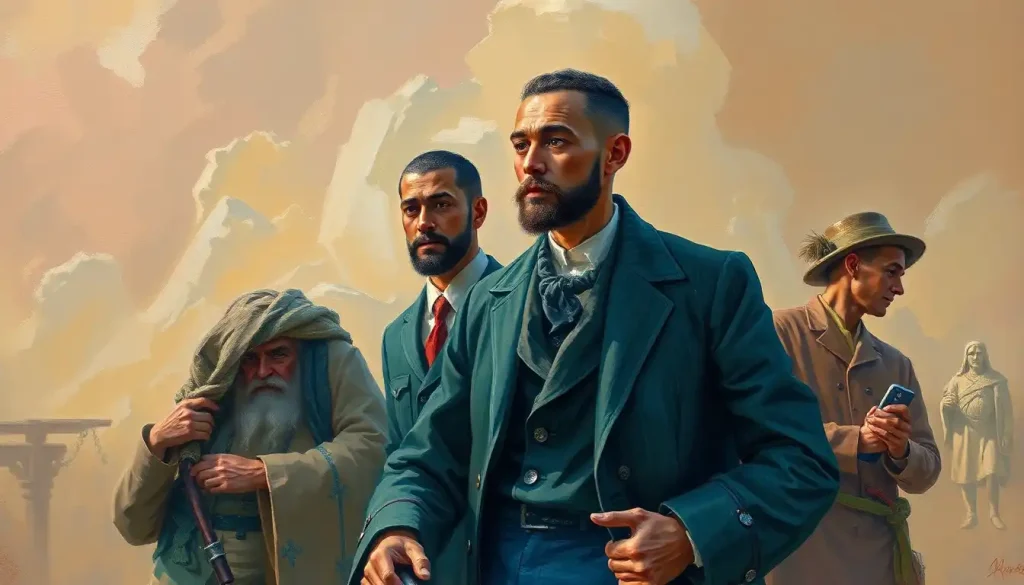From humble garage startups to world-changing innovations, the remarkable journeys of today’s most influential entrepreneurs prove that with grit, vision, and a dash of audacity, anyone can transform a simple idea into a global empire. These tales of triumph over adversity, creativity in the face of challenges, and unwavering determination have become the stuff of legend, inspiring countless individuals to pursue their own entrepreneurial dreams.
The power of entrepreneur stories lies not just in their ability to motivate, but also in their capacity to educate and illuminate the path to success. By delving into the experiences of those who have blazed trails before us, we gain invaluable insights into the mindset, strategies, and perseverance required to build something truly extraordinary.
But what exactly is an entrepreneur? At its core, entrepreneurship is about identifying opportunities, taking calculated risks, and creating value where none existed before. It’s about seeing the world not as it is, but as it could be, and having the courage to bridge that gap. Entrepreneurial Success Stories: Inspiring Examples of Modern Business Pioneers abound in our modern world, each offering a unique perspective on what it means to be a true innovator.
As we embark on this journey through the lives and lessons of some of the most influential entrepreneurs of our time, prepare to be inspired, challenged, and perhaps even a little bit star-struck. From tech titans who started in garages to social entrepreneurs changing lives across the globe, these stories remind us that the path to success is rarely straight, often bumpy, but always worth the ride.
From Garage to Global Empire: Tech Titans’ Humble Beginnings
Let’s kick things off with a trip down memory lane, shall we? Picture this: a cluttered garage in Cupertino, California, circa 1976. Two young men, Steve Jobs and Steve Wozniak, are hunched over a workbench, tinkering with what would become the first Apple computer. Little did they know that this modest beginning would lead to a tech revolution that would change the world as we know it.
Jobs, with his iconic black turtleneck and magnetic stage presence, would go on to become the face of Apple. But it wasn’t all smooth sailing. After being ousted from his own company in 1985, Jobs made a triumphant return in 1997, leading Apple to new heights with groundbreaking products like the iPod, iPhone, and iPad. His story is a testament to the power of resilience and the importance of staying true to one’s vision, even in the face of adversity.
But Apple isn’t the only tech giant with humble beginnings. Let’s zip over to a Harvard dorm room in 2004, where a young Mark Zuckerberg is furiously coding what would become Facebook. What started as a way to connect college students has grown into a global social media behemoth, reshaping how we communicate, share information, and even view ourselves.
Zuckerberg’s journey from dorm room coder to Silicon Valley titan is a prime example of how a simple idea, executed with passion and precision, can snowball into something truly world-changing. It’s also a reminder that age is just a number when it comes to entrepreneurship – sometimes, the fresh perspective of youth can be the secret ingredient to disrupting entire industries.
And speaking of disruption, let’s not forget about the man who turned online book sales into an e-commerce empire: Jeff Bezos. In 1994, Bezos quit his Wall Street job and set up shop in his garage, determined to capitalize on the growing potential of the internet. Amazon started by selling books, but Bezos had a grander vision – to create “the everything store.”
Today, Amazon is not just a store; it’s a technological powerhouse, a cloud computing giant, and even a space exploration company. Bezos’ story teaches us the value of thinking big, starting small, and relentlessly expanding our horizons. It’s a reminder that true entrepreneurship isn’t just about building a successful business – it’s about reimagining entire industries and pushing the boundaries of what’s possible.
Against All Odds: Overcoming Adversity in Business
Now, let’s shift gears and talk about some entrepreneurs who didn’t just overcome obstacles – they smashed through them like the Kool-Aid Man bursting through a brick wall. First up, the queen of media herself, Oprah Winfrey.
Born into poverty in rural Mississippi, Oprah’s early life was marked by hardship and trauma. But she refused to let her circumstances define her. Through sheer determination and an uncanny ability to connect with people, she rose from local news anchor to talk show host to media mogul. Oprah’s story is a powerful reminder that your starting point doesn’t determine your destination. It’s about grit, authenticity, and the courage to be vulnerable in a world that often rewards toughness.
Next, let’s hop across the pond to meet Sir Richard Branson, the flamboyant founder of the Virgin Group. Branson’s journey is a masterclass in turning weaknesses into strengths. Diagnosed with dyslexia at a young age, Branson struggled in traditional academic settings. But rather than letting this hold him back, he leaned into his strengths – creativity, people skills, and a knack for spotting opportunities.
Starting with a student magazine and a mail-order record business, Branson built an empire that spans airlines, telecommunications, and even space travel. His story teaches us that success isn’t about fitting into a predetermined mold – it’s about creating your own path and playing to your unique strengths.
Last but certainly not least in this trio of triumph over adversity is Arianna Huffington. Born in Greece, Huffington moved to England at 16 with barely a word of English in her vocabulary. Fast forward a few decades, and she’s co-founding one of the most influential news websites in the world, The Huffington Post.
But Huffington’s entrepreneurial journey didn’t stop there. After a personal wake-up call (quite literally – she collapsed from exhaustion), she pivoted to focus on wellness and work-life balance, founding Thrive Global. Her story is a powerful reminder that success isn’t just about professional achievements – it’s about creating a life that’s sustainable and fulfilling.
Social Entrepreneurs: Changing the World Through Business
Now, let’s talk about a special breed of entrepreneurs – those who are using the power of business to tackle some of the world’s most pressing problems. These social entrepreneurs are proving that profit and purpose aren’t mutually exclusive. In fact, they can be a powerful combination.
First up, let’s meet Muhammad Yunus, the father of microfinance. Yunus, an economics professor in Bangladesh, was struck by the cycle of poverty he saw around him. Traditional banks wouldn’t lend to the poor, leaving them at the mercy of predatory lenders. Yunus had a radical idea – what if we could provide small loans to help people start businesses and lift themselves out of poverty?
This idea led to the founding of Grameen Bank, pioneering the concept of microfinance. Yunus’ work has helped millions of people around the world, particularly women, gain financial independence. It’s a powerful example of how innovative thinking can create solutions to seemingly intractable problems.
Next, let’s lace up our shoes and talk about Blake Mycoskie, the founder of TOMS Shoes. During a trip to Argentina, Mycoskie was struck by the number of children he saw without shoes. This observation led to a simple but revolutionary idea – for every pair of shoes sold, TOMS would donate a pair to a child in need.
This “One for One” model not only created a successful business but also sparked a movement in conscious consumerism. Mycoskie’s story shows us that business can be a force for good, and that consumers are eager to support companies that align with their values.
Lastly, let’s shine a spotlight on Leila Janah, the founder of Samasource. Janah’s mission was to tackle global poverty through digital work. Samasource provides training in digital skills to people in underserved communities, then connects them with work opportunities from major tech companies.
Janah’s innovative approach has provided dignified work to thousands of people in countries like Kenya, Uganda, and India. Her story reminds us that technology can be a powerful tool for social good when applied creatively and compassionately.
Disruptors and Innovators: Redefining Industries
Now, let’s talk about the rebels, the mavericks, the ones who looked at entire industries and said, “Nah, I think we can do better.” These are the disruptors and innovators who aren’t just playing the game – they’re changing the rules.
First up, the man who seems to be on a one-man mission to revolutionize… well, everything: Elon Musk. From online payments (PayPal) to electric cars (Tesla) to space exploration (SpaceX) to renewable energy (SolarCity), Musk has a knack for identifying industries ripe for disruption and diving in headfirst.
What sets Musk apart is his willingness to tackle seemingly impossible challenges. When he announced his intention to make electric cars mainstream and land rockets on floating platforms, many thought he was dreaming. But through a combination of technological innovation, bold vision, and sheer force of will, Musk has turned these dreams into reality. His story teaches us the value of thinking big – really big – and not being afraid to challenge conventional wisdom.
Next, let’s talk about a guy who made it okay to sleep in strangers’ homes: Brian Chesky, co-founder of Airbnb. When Chesky and his roommates decided to rent out air mattresses in their apartment to make some extra cash, they stumbled upon an idea that would revolutionize the hospitality industry.
Airbnb didn’t just create a new platform; it tapped into a desire for more authentic, personalized travel experiences. Along the way, it faced significant regulatory challenges and skepticism about its business model. But Chesky and his team persevered, adapting their approach and working with cities to address concerns. Today, Airbnb is a household name, and Chesky’s journey reminds us that sometimes the best ideas come from solving our own problems.
Last but not least, let’s queue up the story of Reed Hastings and the Netflix revolution. Remember the days of Blockbuster and late fees? Hastings sure does – in fact, a $40 late fee for a movie rental was part of the inspiration for Netflix.
What started as a DVD-by-mail service has evolved into a streaming giant that’s changing how we consume entertainment. But it wasn’t a smooth ride. When Netflix announced its shift from DVDs to streaming, it faced significant backlash. But Hastings stuck to his guns, believing that streaming was the future of entertainment.
He was right, and Netflix’s success has forced entire industries to adapt. From producing original content to changing how we binge-watch our favorite shows, Netflix under Hastings’ leadership has redefined what it means to be a media company in the 21st century.
Lessons Learned: Key Takeaways from Entrepreneur Success Stories
Alright, folks, we’ve been on quite a journey, haven’t we? We’ve traveled from garages to dorm rooms, from poverty to wealth, from crazy ideas to world-changing innovations. Now, let’s take a moment to distill some of the key lessons from these Successful Entrepreneurship Stories: Inspiring Tales of Innovation and Perseverance.
First up: Embrace failure as a stepping stone to success. If there’s one thing that unites almost all of these entrepreneurs, it’s their ability to view failure not as an end, but as a beginning. Steve Jobs was fired from the company he founded. Oprah Winfrey was told she was “unfit for television news.” Richard Branson has had his share of failed ventures (Virgin Cola, anyone?).
But here’s the kicker – they all used these setbacks as fuel for their next big move. They understood that failure isn’t the opposite of success; it’s a part of success. So the next time you face a setback, remember: you’re in good company. Dust yourself off, learn from it, and keep pushing forward.
Next lesson: Passion and perseverance are your secret weapons. Building a successful business isn’t a sprint; it’s a marathon. And what gets you through those long nights, tough decisions, and moments of doubt? Passion for what you’re doing and the perseverance to see it through.
Look at Jeff Bezos, working long hours in his garage in the early days of Amazon. Or Arianna Huffington, learning a new language and culture to pursue her dreams. Their passion for their vision gave them the strength to persevere through challenges that would have deterred less committed individuals.
Another crucial lesson: Be ready to adapt and pivot when necessary. The business world moves fast, and what works today might not work tomorrow. The most successful entrepreneurs are those who can read the winds of change and adjust their sails accordingly.
Reed Hastings pivoted Netflix from a DVD rental service to a streaming platform, fundamentally changing the company’s business model. Mark Zuckerberg evolved Facebook from a college networking site to a global social media platform. The ability to adapt – without losing sight of your core vision – is key to long-term success.
Last but not least: Build strong teams and foster innovation. No entrepreneur achieves success in a vacuum. Even the most visionary leaders rely on teams of talented individuals to turn their ideas into reality.
Elon Musk may be the face of Tesla and SpaceX, but he’s quick to credit the engineers and innovators who make the magic happen. Oprah Winfrey built a media empire by surrounding herself with skilled producers, writers, and business minds.
The lesson? Don’t just hire employees – build a team. Foster an environment where innovation is encouraged, where ideas can flow freely, and where everyone feels invested in the company’s success.
Wrapping It Up: The Ongoing Impact of Entrepreneur Stories
As we come to the end of our whirlwind tour through these Entrepreneurs in Action: Real-Life Examples of Business Innovators, it’s clear that the impact of these stories extends far beyond the business world. They inspire us to dream bigger, to persevere in the face of adversity, and to believe in the power of a single idea to change the world.
From Steve Jobs’ legendary product launches to Muhammad Yunus’ mission to end poverty, from Oprah Winfrey’s media empire to Elon Musk’s interplanetary ambitions, these stories remind us of the incredible potential that lies within each of us.
To all the aspiring entrepreneurs out there, remember this: every empire starts with a single step. Your garage startup today could be tomorrow’s global corporation. Your dorm room project could revolutionize an entire industry. Your crazy idea, the one that everyone says is impossible? It just might be the next big thing.
So dream big. Take risks. Embrace failure as a teacher. Surround yourself with great people. And above all, believe in yourself and your vision.
The impact of these entrepreneur stories isn’t just in the businesses they’ve built or the wealth they’ve created. It’s in the lives they’ve changed, the industries they’ve transformed, and the possibilities they’ve opened up for all of us.
Who knows? Maybe someday, it’ll be your story inspiring the next generation of entrepreneurs. So what are you waiting for? Your journey starts now. Go make some history.
References:
1. Isaacson, W. (2011). Steve Jobs. Simon & Schuster.
2. Vance, A. (2015). Elon Musk: Tesla, SpaceX, and the Quest for a Fantastic Future. Ecco.
3. Stone, B. (2013). The Everything Store: Jeff Bezos and the Age of Amazon. Little, Brown and Company.
4. Branson, R. (2011). Losing My Virginity: How I Survived, Had Fun, and Made a Fortune Doing Business My Way. Crown Business.
5. Winfrey, O. (2014). What I Know For Sure. Flatiron Books.
6. Mycoskie, B. (2011). Start Something That Matters. Spiegel & Grau.
7. Yunus, M. (1999). Banker to the Poor: Micro-Lending and the Battle Against World Poverty. PublicAffairs.
8. Huffington, A. (2014). Thrive: The Third Metric to Redefining Success and Creating a Life of Well-Being, Wisdom, and Wonder. Harmony.
9. Gallo, C. (2016). The Innovation Secrets of Steve Jobs: Insanely Different Principles for Breakthrough Success. McGraw-Hill Education.
10. Ries, E. (2011). The Lean Startup: How Today’s Entrepreneurs Use Continuous Innovation to Create Radically Successful Businesses. Crown Business.












Would you like to add any comments? (optional)